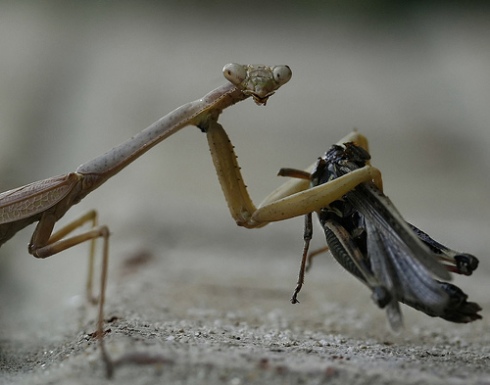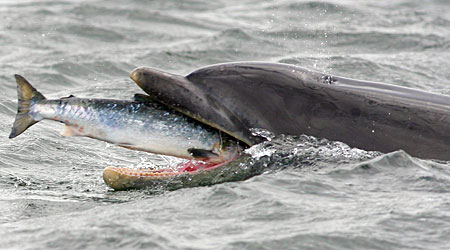It’s that time in the semester when I cover Peter Singer, whom I’ve commented on several times in various posts. This year I’m doing it in an Ethics course for Seniors, which I took over for a retiring colleague, though I normally spend some time on Singer, personhood theory, & related issues in my Philosophy course. Great fun, especially after the material on Social Darwinism & eugenics. In Ethics we make a quick romp through utilitarianism & then consider contemporary attempts to defend or revise it. Singer fits perfectly here, as his attempt to update the theory with what he calls “preference utilitarianism” has made some waves, especially how he applies it in cases regarding infants, the elderly, & those suffering from a variety of cognitive disabilities. The students are often, predictably, unsettled by what he says. I tell them that Singer is hoping to, among other things, shock people by his statements, partly in order to get their attention, & partly to encourage us to discard any semblance of genuine compassion, traditionally understood. So when he claims that there is no real difference between killing a snail & killing a day-old infant, since neither have genuine desires that can be thwarted, & that it would have been wrong for someone to have killed any of his children when they were infants not because of what those children were, but simply because he & his wife had the desire that they live. . . . Ah, well, moral insanity has its logic & its appeal. I still think the best comment on this is from GK Chesterton, whom I quoted in a blog entry on Singer. Scroll down this page for that entry; here’s the appropriate quote:
“If you argue with a madman, it is extremely probable that you will get the worst of it; for in many ways his mind moves all the quicker for not being delayed by the things that go with good judgement. He is not hampered by a sense of humour or by charity, or by the dumb certainties of experience. He is the more logical for losing certain sane affections. Indeed, the common phrase for insanity is in this respect a misleading one. The madman is not the man who has lost his reason. The madman is the man who has lost everything except his reason.”
Very nice, & to the point. Reason is Singer’s mantra, though a castrated form, one divorced from Pascal’s recognition that while reason is necessary to think well, it is hardly sufficient. Other things, according to Pascal, will always intrude. Freud knew this as well, though he developed different conclusions than did Pascal. Both recognized that it is rather comical to base one’s life on the confidence that we are completely in control of our reason. At any rate, the Singer brand of utilitarian logic is increasingly on display by someone pretending to do serious thought; again, at the risk of being overly self-referential, check out my blog entry below on “miserabilism,” that absurd extension of the Philosophy of Eeyore that is making its way into print these days. Here’s yet another example, from the opinion page of the Times. According to Jeff McMahan, a philosopher at Rutgers, it’s time for us to deal decisively with the pesky problem of carnivores. Not just humans who enjoy cheeseburgers or chicken caesar salads. McMahan’s piece is no simple screed against enjoying a double-double from In-N-Out Burger or wearing Cole Haans. No, he’s after bigger game, namely, lions & tigers & bears. Because they devour other animals in order to survive & have, unlike humans, no vegan options, they produce massive amounts of suffering. And, as every utilitarian, classical or contemporary, knows, suffering must be stopped, or at least mitigated as much as possible. And since Mufasa, Tigger, & Yogi can not be reasoned with to eat soy-based products & whatnot, a more radical solution is necessary: gradual forced extinction of carnivores. We can help with that, wisely, gently, & over time. Having bigger brains gives us certain responsibilities, including easing the pain of giraffes, salmon, & the hordes of other animals & insects whose right to happiness is routinely ignored by hungry predators. Go here for the story, entitled “The Meat Eaters.”
Just a little love bite? While this seems like territorial behavior, hippos have been known to eat other animals, &, on occasion, other hippos

Now we’re getting to the real cruelty. . .

The fact that there are favorable responses to the Times piece suggests many things, none of them pretty. Likewise, some of the responses suggest people who have a bad taste in their mouths, but can’t quite say why. Apparently they lack either the conceptual resources to understand the shell game being played on them & the ability to articulate that they are being conned. The fact that there are people who write this kind of thing & are given the title “philosopher” is even more distressing. I imagine Dr. McMahan will have to contact the movie studios to encourage them to stop making films with sympathetic carnivores in leading roles before his proposals can be seriously entertained, since, as Newman pointed out, we can not believe what we can not imagine being true. Shape the imagination & the desire of a child, & he’s yours. Every respectable advertiser & movie executive knows this, not to mention Aristotle. Think of the horror of all those children being exposed to cuddly lil’ lions etc. & not being instructed on Bentham, Mill, & Singer. And, I have to wonder, what about the fish? Remember Coral, & the suffering that selfish barracuda caused poor Marlin in Finding Nemo? This qualifies as predation, & I wonder if McMahan is as concerned about Nemo & his numerous brothers & sisters who never had at a chance to experience freedom as he is about Bambi. And, getting more serious, what about those primates like chimpanzees that have an apparently vicious streak that leads them occasionally to tear apart & eat each other as part of violent takeovers of territory? This qualifies as the inflicting of suffering, doesn’t it? But you have to be careful with animals like chimps if you’re a utilitarian, since they are increasingly seen as “persons” by the personhood theorists like Singer. McMahan also has a gig at Princeton, where Singer teaches. Does he, too, embrace personhood theory? If so, how will he propose we deal with those chimps? And what about all the birds that feed on little animals? The insects & their predatory ways? Spiders, snakes, digger wasps? Or the many viruses that are living things? Do they not have responsibilities & rights? Oh, the horror. . . . Yes, I’m being ridiculous, but I didn’t start this mess. Proposals like McMahan’s will extend in numerous directions, intended or not. Singer has attempted to avoid the madness implied in his thought by saying, yes, while some animals do in fact qualify as persons, most don’t. In a book review he once helpfully noted that while bestiality seldom harms the animal partner, the chicken is in fact choked by the act of male penetration (stop laughing), so there is a morality involved here. We can, & must, make careful distinctions between the many different species of animals, which McMahan recognizes. But once we target the elimination of suffering as our principal ethical goal, can we ever stop? Will reason allow it?
The mean bald eagle, unversed in Mill, preparing to inflict suffering

What about this guy? That ain’t a hug.

Really, though, McMahan does quote Isaiah early on; he could also have quoted St. Paul in Romans 8 on how creation is eagerly awaiting its redemption. Yes, many of us believe animal predation is somehow a consequence of the corruption resulting from the fall, & we do look forward to when lambs are no longer slaughtered & eaten by wolves, lions, etc. I don’t want to be flippant here. But c’mon. Isn’t enough enough already? A dog is a pig is a boy or whatever, fly-swatting as murder, save the whales but who cares about the unborn children, ridiculous signage (see below). All this further illustrates Dostoevsky’s “Without God, anything is permissible,”along with Nietzsche’s fears of how nihilism will produce moronic attempts to create meaning, along with attempts at moral philosophy that are painfully indifferent to the facts. Has Prof. McMahan any background in ecology to speak so confidently of the forced extinction of scores of species of animals? He seems aware of possible difficulties here, & he does try to temper his enthusiasm a bit. But I wonder if he has ever considered that his position embraces the very kind of speciesist imperialism that contemporary utilitarians so love to disparage? I can imagine animals everywhere thinking, “Who the hell does he think he is?” Or, more to the point for the slippery-slopers, has he thought through to the obvious conclusion to his brand of thinking that, since humans cause great suffering to many species, our own included, we should be the first to go? See the miserabilists for that bit of logical clarity. Yes, by all means, Professor, & all you utilitarians pursuing reason, suffering must stop. You, the personhood crowd, & the miserabilists can all help by discovering a sense of humour, charity, & the dumb certainties of experience, not to mention common sense, that which in the real world helps people not to adopt theories which insult all of what GKC listed above. Along with a measure of true compassion, exercised on the truly vulnerable among us, those fellows like Singer have targeted for merciful deaths. Or, at least, come clean & tell us this is all a big joke, a way of making the Times & bloggers like me look silly & keeping unqualified people who know their lack in teaching positions with tenure & impressive titles. But Singer has repeated shown how humorless contemporary utilitarians can be, so I’m not optimistic that any of these folks have a sense of humor. If Prof. McMahan is joking, may he accept my sincere apologies.

At any rate, here’s the last paragraph of the editorial in the Times to give you a bit of a flavor:
Here, then, is where matters stand thus far. It would be good to prevent the vast suffering and countless violent deaths caused by predation. There is therefore one reason to think that it would be instrumentally good if predatory animal species were to become extinct and be replaced by new herbivorous species, provided that this could occur without ecological upheaval involving more harm than would be prevented by the end of predation. The claim that existing animal species are sacred or irreplaceable is subverted by the moral irrelevance of the criteria for individuating animal species. I am therefore inclined to embrace the heretical conclusion that we have reason to desire the extinction of all carnivorous species, and I await the usual fate of heretics when this article is opened to comment.
This does sound tongue-in-cheek, doesn’t it? I can imagine a couple of friends of mine, after a couple bourbons on a late Saturday night, deciding to scam the gullible by this kind of thing. What to say if McMahan is actually serious? How about: “What a hero! Awaiting the stake, as the more orthodox human carnivores stoke the fire. The courage of our noble intellectuals, bravely voicing their contrararian views in the face of massive, crushing opposition, blah blah blah.” But please. Charity alone prevents me from saying something cheeky & preposterous like “Pass me another steak, Professor; &, while you’re at it, a crocodile for my hippopotamus.”
Yes we can. It’s about time. It’s about change.
